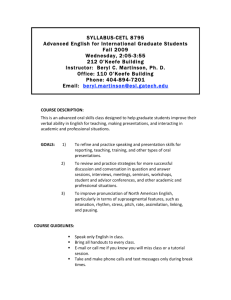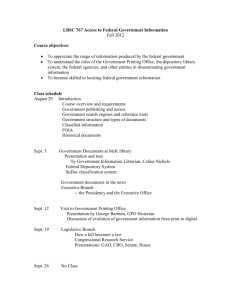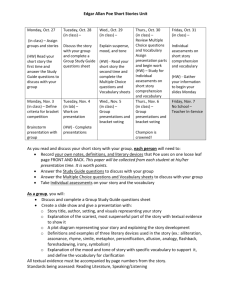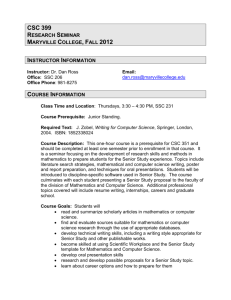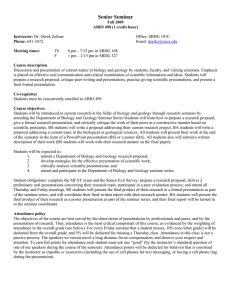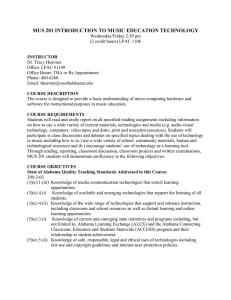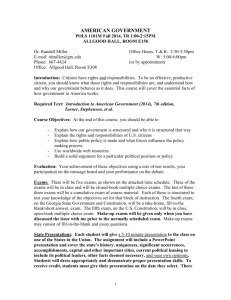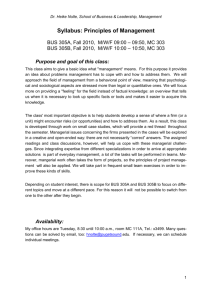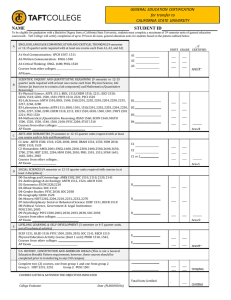office: 2256-40 - Miami Dade College
advertisement
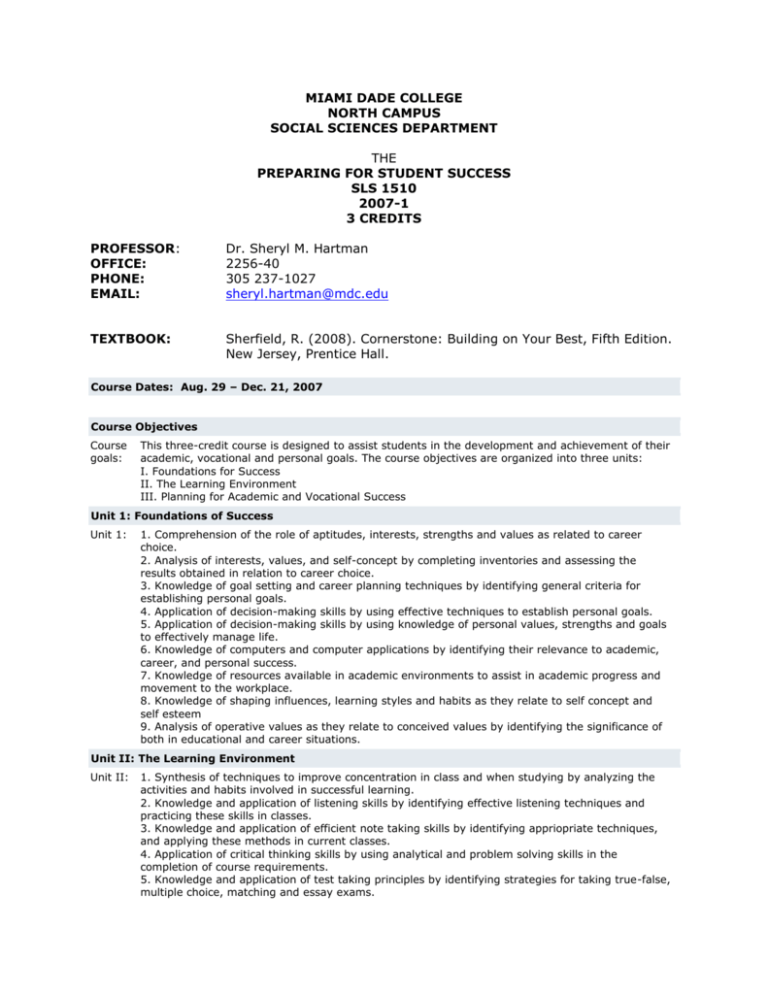
MIAMI DADE COLLEGE NORTH CAMPUS SOCIAL SCIENCES DEPARTMENT THE PREPARING FOR STUDENT SUCCESS SLS 1510 2007-1 3 CREDITS PROFESSOR: OFFICE: PHONE: EMAIL: Dr. Sheryl M. Hartman 2256-40 305 237-1027 sheryl.hartman@mdc.edu TEXTBOOK: Sherfield, R. (2008). Cornerstone: Building on Your Best, Fifth Edition. New Jersey, Prentice Hall. Course Dates: Aug. 29 – Dec. 21, 2007 Course Objectives Course goals: This three-credit course is designed to assist students in the development and achievement of their academic, vocational and personal goals. The course objectives are organized into three units: I. Foundations for Success II. The Learning Environment III. Planning for Academic and Vocational Success Unit 1: Foundations of Success Unit 1: 1. Comprehension of the role of aptitudes, interests, strengths and values as related to career choice. 2. Analysis of interests, values, and self-concept by completing inventories and assessing the results obtained in relation to career choice. 3. Knowledge of goal setting and career planning techniques by identifying general criteria for establishing personal goals. 4. Application of decision-making skills by using effective techniques to establish personal goals. 5. Application of decision-making skills by using knowledge of personal values, strengths and goals to effectively manage life. 6. Knowledge of computers and computer applications by identifying their relevance to academic, career, and personal success. 7. Knowledge of resources available in academic environments to assist in academic progress and movement to the workplace. 8. Knowledge of shaping influences, learning styles and habits as they relate to self concept and self esteem 9. Analysis of operative values as they relate to conceived values by identifying the significance of both in educational and career situations. Unit II: The Learning Environment Unit II: 1. Synthesis of techniques to improve concentration in class and when studying by analyzing the activities and habits involved in successful learning. 2. Knowledge and application of listening skills by identifying effective listening techniques and practicing these skills in classes. 3. Knowledge and application of efficient note taking skills by identifying appriopriate techniques, and applying these methods in current classes. 4. Application of critical thinking skills by using analytical and problem solving skills in the completion of course requirements. 5. Knowledge and application of test taking principles by identifying strategies for taking true-false, multiple choice, matching and essay exams. Unit III: Planning for Academic and Career Success Unit III: 1. Comprehension of educational motives by describing reasons for completing selected program of study. 2. Application of academic program planning. 3. Synthesis of educational motives and academic progress by developing an educational plan that incorporates completion of academic program goals. 4. Synthesis of self assessment, career exploration and decision making skills by developing a career plan which incorporates the results of the assessment and goal setting activities of the course. The goals and objectives of this course will be achieved by several activities Lectures Small group work/discussions WebQuests/WebCT assignments Technology Inventories Personal Philosophy of Success Essay Quizzes Oral presentation(Individual or Group) Final Exam Class attendance Miami Dade College Policy requires that attendance is taken every class. Regular classroom attendance is expected. Many learning objectives and activities leading to successful completion of the course objectives require class participation. If for any reason you are absent, it is the responsibility of you, the student, to find out what has occurred in the class and to be prepared for the next class session. You are allowed two absences after which 10 percentage points may be deducted from your final course point total for each absence. In addition, point carrying critical thinking exercises reinforce the importance of attendance. You must be present to earn these. Late arrival, early departure, eating, drinking, ringing, buzzing or musical signals are inconsiderate behaviors and are to be avoided. Repeated instances of the above may constitute one absence. Evaluation Activity Critical Thinking Exercises (4) Discussion Board Postings (2) In class participation (10 sessions) Personal Philosophy of Success Essay Quizzes (2) Presentation Final Exam Point Value 30 15 100 15 10 15 15 Grading Policy Grade A B C D F Interpretation Excellent Good Average Poor Point Value 180-200 160-179 140-159 120-139 Below 120 Calculating your progress: Divide the number of points you have earned by the number assigned. The quotient is your current grade. SLS 1510 Fall 2007/1 2 of 4 ASSIGNMENTS AND DUE DATES Week 1 Sept. 8 Chapter 1: Change Adjusting to the Culture of College and Setting Your Goals Week 2 Sept. 15 Chapter 2: Engage Developing Your Academic and Personal Passion Week 3 Sept. 22 Week 4 Sept. 29 Week 6 Oct. 6 Week 7 Oct 13 Week 8 Oct. 20 Week 9 Oct. 27 Week 10 Nov. 3 Week 11 Nov. 10 Week 12 Nov. 17 Week 13 Week 14 Nov 24 Dec. 1 Week 15 Dec. 8 Week 16 Dec. 15 Chapter 3: Persist Learning and Using the Tools of Self Management Critical Thinking Exercise #1 Chapter 4: Prioritize Planning Your Time and Reducing Stress Stress Mastery Training Chapter 5: Read Building Your Reading and Comprehension Skills Quiz 1 Degree Audit Interpretation/ Registration Individual Education Plans Critical Thinking Exercise #2 Library Resources Critical Thinking Exercise #3 Chapter 6: Learn Using Your Dominant Intelligence, Learning Style, and Personality Type to Become an Active Learner Quiz 2 Chapter 7: Record Cultivating Your Listening Skills and Developing Note-Taking Systems that Work for You Critical Thinking Exercise #4 Student Presentations Chapter 8:Remember Empowering Your Memory and Creating Your Study Plans Student Presentations Chapter 9: Assess Developing Successful Test-taking Tactics that Work for You Student Presentations No class-Holiday Period Ch 14: Live Developing Your Plan for Wellness, and Personal Responsibility Student Presentations Chapter 15: Plan Focusing on Your Professional Career and Living Well Personal Philosophy of Success Essay Final Examination SLS 1510 Fall 2007/1 3 of 4 Student Presentations Guidelines: 1. Students will work in pairs. 2. Students must have their project approved by Professor and provide her with a preliminary project outline as well as a final product. 3. Choose a method for students to experience and understand your topic – podcasts, music, workshop, skits, PowerPoint’s, other technology. 4. In the process of your presentation/demonstration, you must: a. Define, explain, and discuss your topic so that the class understands it. b. Describe the benefits of being effective and knowledgeable in this topic c. Describe the consequences of lacking effectiveness and awareness on this topic. Presentations will be graded on: 1. Content: How thoroughly did you cover the topic? How well did you describe the benefits of being aware and effective and the consequences of lacking effectiveness? 2. Organization: Was the presentation organized so that your audience could understand your message? 3. Delivery: Did you use professional presentation strategies in your delivery? How effective was your delivery? Was it well rehearsed and not read? 4. Methodology: How creative were you in using media and other methods in your presentation? Topic List – You may add additional topics 1. Developing Stress mastery 2. Seeking Balance: Mind, Body and Spirit 3. Mastering Time: Stephen Covey’s Time Management Quadrant 4. Resolving Conflict in the Workplace 5. Anger and Learning to Control Anger 6. Being an Effective Leader 7. Finding and Choosing the Career for you 8. Getting the Job You Want: Job Searches and Interviews 9. Developing Win-Win Solutions 10. Benefits of Emotional Intelligence: Understanding Yourself 11. Benefits of Interpersonal Intelligence: Understanding Others SLS 1510 Fall 2007/1 4 of 4

